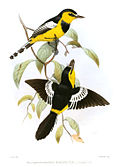Batis (bird)
| Batis | |
|---|---|

| |
| Woodwards's batis, Batis fratrum | |
| Scientific classification | |
| Domain: | Eukaryota |
| Kingdom: | Animalia |
| Phylum: | Chordata |
| Class: | Aves |
| Order: | Passeriformes |
| Family: | Platysteiridae |
| Genus: | Batis F. Boie, 1833 |
| Type species | |
| Muscicapa capensis[1] Linnaeus, 1766
| |
| Species | |
|
See text | |
Batis (pronounced BAT-iss) is a genus of passerine birds in the wattle-eye family. Its species are resident in Africa south of the Sahara. They were previously classed as a subfamily of the Old World flycatcher family, Muscicapidae.
They are small stout insect-eating birds, usually found in open forests or bush. The nest is a small neat cup low in a tree or bush. They hunt by flycatching, or by taking prey from the ground like a shrike.
Batis species are strikingly patterned, typically with a grey crown, black eye mask, dark back, and paler underparts, often with a coloured or black breast band and white on the throat which contrasts strongly with the black eye stripe. Male and female plumages usually differ.
The song is typically a descending triple whistle.
Taxonomy
[edit]The genus Batis was introduced by the German zoologist Friedrich Boie in 1833.[2] The type species was subsequently designated as the Cape batis.[3] The name of the genus is from the Ancient Greek batis, batidos, an unidentified worm-eating bird mentioned by Aristotle.[4]
The genus contains 20 species.[5]
- Rwenzori batis, Batis diops
- Margaret's batis, Batis margaritae
- Forest batis, Batis mixta
- Dark batis, Batis crypta
- Cape batis, Batis capensis
- Malawi batis, Batis dimorpha
- Woodwards's batis, Batis fratrum
- Chinspot batis, Batis molitor
- Senegal batis, Batis senegalensis
- Grey-headed batis, Batis orientalis
- Pale batis, Batis soror
- Pririt batis, Batis pririt
- Eastern black-headed batis, Batis minor
- Western black-headed batis, Batis erlangeri
- Pygmy batis, Batis perkeo
- Angola batis, Batis minulla
- Gabon batis, Batis minima
- Ituri batis, Batis ituriensis
- West African batis, Batis occulta
- Fernando Po batis, Batis poensis
References
[edit]- ^ "Platysteiridae". aviansystematics.org. The Trust for Avian Systematics. Retrieved 2023-07-16.
- ^ Boie, Friedrich (1833). "Fernere Vemertungen über Classification der Vögel". Isis von Oken (in German). 26. Col 876-884 [880].
- ^ Mayr, Ernst; Cottrell, G. William, eds. (1986). Check-list of Birds of the World. Vol. 11. Cambridge, Massachusetts: Museum of Comparative Zoology. p. 378.
- ^ Jobling, J.A. (2018). del Hoyo, J.; Elliott, A.; Sargatal, J.; Christie, D.A.; de Juana, E. (eds.). "Key to Scientific Names in Ornithology". Handbook of the Birds of the World Alive. Lynx Edicions. Retrieved 24 June 2018.
- ^ Gill, Frank; Donsker, David; Rasmussen, Pamela, eds. (February 2025). "Batises, bushshrikes, boatbills, vangas (sensu lato)". IOC World Bird List Version 15.1. International Ornithologists' Union. Retrieved 10 March 2025.
- Fjeldså, Jon; Bowie, Rauri C.K.; Kiure, Jacob (2006). "The forest batis, Batis mixta, is two species: description of a new, narrowly distributed Batis species in the Eastern Arc biodiversity hotspot" (PDF). Journal of Ornithology. 147 (4): 578–590. Bibcode:2006JOrni.147..578F. doi:10.1007/s10336-006-0082-4. S2CID 31793603. Archived from the original (PDF) on 2011-05-17. Retrieved 2008-02-27.
- Sinclair, Ian; Hockey, Phil; Tarboton, Warwick (2002). SASOL Birds of Southern Africa. Cape Town: Struik. ISBN 1-86872-721-1.








